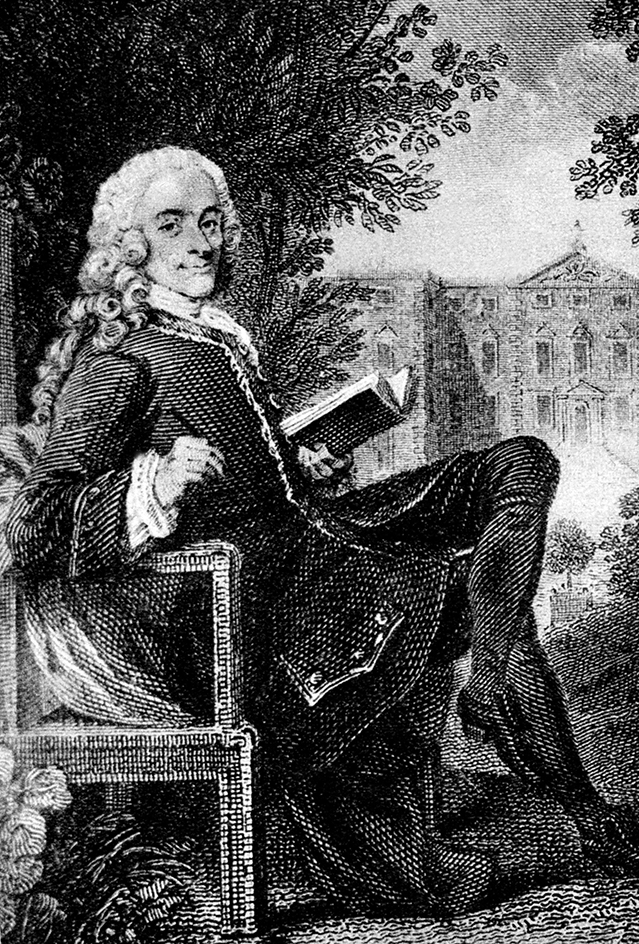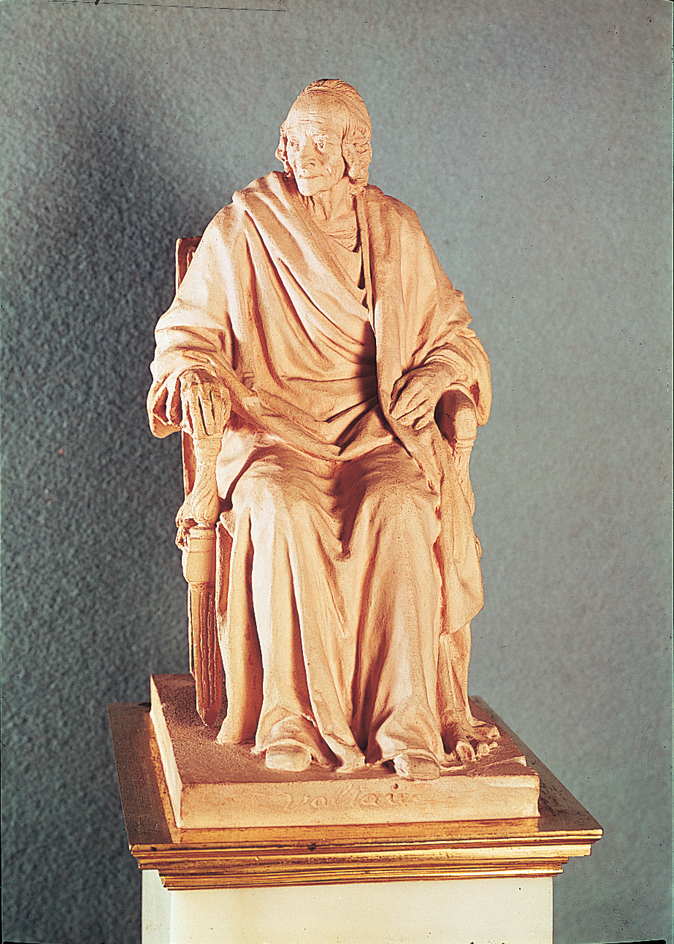Voltaire, << vol TAR or vohl TAR >> (1694-1778), was the pen name of François-Marie Arouet, a French author and philosopher. Voltaire’s clear style, sparkling wit, keen intelligence, and strong sense of justice made him one of France’s most famous writers.

Candide (1759), Voltaire’s best-known work, is a brilliant philosophical tale that has been translated into more than 100 languages. On the surface, the work describes the adventures of an inexperienced young man as he wanders around the world. Philosophically, Candide is recognized as a complex inquiry into the nature of good and evil.
Voltaire, the son of a lawyer, was born on Nov. 21, 1694, in Paris. He received an excellent education at a Jesuit school. He showed little inclination to study law, and his schooling ended at the age of 16. He soon joined a group of sophisticated aristocrats who had little reverence for anything except wit, pleasure, and literary talent. Paris society sought Voltaire’s company because of his cleverness, his remarkable ability to write verses, and his gift for making people laugh.
There are several theories about the origin of Voltaire’s pen name, which he adopted in 1718. The most widely accepted one is that Voltaire comes from an imperfect arrangement of the letters making up the French equivalent of Arouet the Younger.

Imprisonment and early success.
In 1717, Voltaire was imprisoned in the Bastille for satirical verses that he may or may not have written ridiculing the government. During his 11 months in prison, he finished his tragedy Oedipe. The success of the play in 1718 made Voltaire the greatest French playwright of his time. He maintained this reputation—with more than 50 plays—for the rest of his life. While in prison, Voltaire also worked on La Henriade, an epic poem about King Henry IV. This poem, written in the style of the Aeneid by the Roman poet Virgil, was published in 1723.
Voltaire became independently wealthy in his early 30’s through an inheritance and wise investments. He was also a celebrity who had three plays performed in 1725 to help celebrate the wedding of King Louis XV. Royal pensions and other honors followed. But all this success ended abruptly in 1726 when the Chevalier de Rohan, a powerful young nobleman, scornfully asked: “What is your name anyway? Monsieur de Voltaire or Monsieur Arouet?” His question implied that Voltaire was claiming to be a nobleman while he was in fact of common origin. Voltaire supposedly replied that whatever his name was, he was bringing it honor, which was more than Rohan could say for himself. This answer cost Voltaire a beating by Rohan’s men. Challenged to a duel by Voltaire, Rohan had him thrown into the Bastille again. A few days later, Voltaire was allowed to choose between continued imprisonment and exile.
Exile and return to France.
Voltaire chose exile. From 1726 to 1729, he lived in England, for him a land of political and religious freedom. There, he met the writers Alexander Pope and Jonathan Swift and was attracted to the ideas of the philosopher John Locke and the scientist Sir Isaac Newton. It has been said that Voltaire went into exile a poet and came back a philosopher.
Voltaire returned to France in 1729, and published several works. The most important ones were History of Charles XII (1731) and his best-known play, Zaïre (1732). In 1733, his Letters Concerning the English Nation appeared in England. This book appeared in France the next year in an unauthorized edition called Philosophical Letters. Voltaire’s praise of English customs, institutions, and style of thought was an indirect criticism of their French counterparts. French authorities condemned the book, and Voltaire fled from Paris.
Voltaire found a home with the Marquise du Chatêlet, one of the most cultured and intelligent women of the day. From 1734 to 1749, he lived in her chateau at Cirey in Lorraine. During this period, he wrote several plays, an essay on metaphysics, two works on Sir Isaac Newton, and some poetry. He also wrote two notable philosophical tales. One of them, Zadig (1747), explores the problem of human destiny. The other, Micromégas, was started at Cirey and was published in 1752. In it, Voltaire used giant visitors from a distant star and from the planet Saturn to discuss the relative insignificance of human pretensions in answering religious questions. In this work, Voltaire also encouraged the use of human reason for the development of science.
Later years.
Following du Chatêlet’s death in 1749, Voltaire accepted the invitation of Frederick the Great to settle in Berlin. After three years of living under the social and intellectual tyranny of the “Philosopher King,” as Voltaire called him, Voltaire settled in Switzerland. He lived near Geneva in a chateau that he named Les Délices (The Delights). It is now the Voltaire Institute and Museum. A severe earthquake in Portugal in 1755 inspired Voltaire to write an important philosophical poem, The Lisbon Disaster. This work was published with his Poem on Natural Law in 1756.
In 1759, Voltaire purchased an estate called Ferney on the French-Swiss border. He lived there until just before his death. In an effort to correct the wrongs he saw in the world, Voltaire produced a constant flow of books, plays, pamphlets, and letters. Ferney soon became the intellectual capital of Europe. There Voltaire wrote Candide, added to his Philosophical Dictionary, and completed his Universal History, also called Essay on the Manners and Spirit of Nations (1759-1766). He fought religious intolerance and aided victims of religious persecution. His rallying cry was “Écrasez l’infâme” (“Crush the evil thing”), referring to religious superstition.
Voltaire returned to Paris at the age of 83 and was enthusiastically received. There he saw his last play, Irène (1778), warmly applauded. But the excitement of the trip was too much for him, and he died in Paris on May 30, 1778.
The Roman Catholic Church, because of much criticism by Voltaire, refused to allow him to be buried in church ground. However, his body was finally taken to an abbey in Champagne. In 1791, Voltaire’s remains were transferred to the Pantheon in Paris, where many of France’s greatest are buried.
